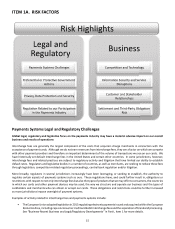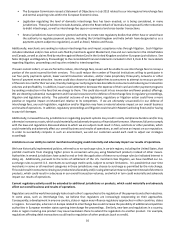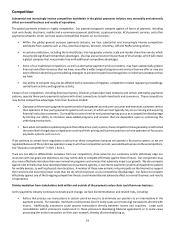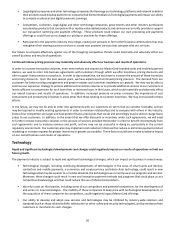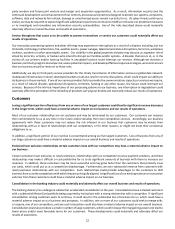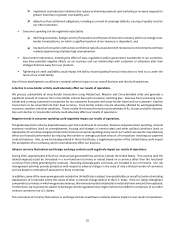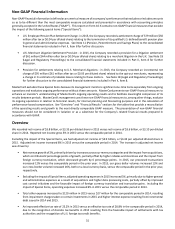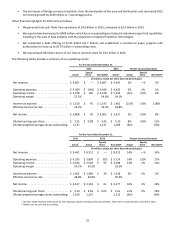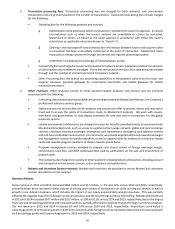MasterCard 2015 Annual Report Download - page 31
Download and view the complete annual report
Please find page 31 of the 2015 MasterCard annual report below. You can navigate through the pages in the report by either clicking on the pages listed below, or by using the keyword search tool below to find specific information within the annual report.
25
implement cost reduction initiatives that reduce or eliminate payment card marketing or increase requests for
greater incentives or greater cost stability, and
default on their settlement obligations, including as a result of sovereign defaults, causing a liquidity crisis for
our other customers.
• Consumer spending can be negatively impacted by
declining economies, foreign currency fluctuations and the pace of economic recovery, which can change cross-
border travel patterns, on which a significant portion of our revenues is dependent, and
low levels of consumer and business confidence typically associated with recessionary environments and those
markets experiencing relatively high unemployment.
• Government intervention, including the effect of laws, regulations and/or government investments in our customers,
may have potential negative effects on our business and our relationships with customers or otherwise alter their
strategic direction away from our products.
• Tightening of credit availability could impact the ability of participating financial institutions to lend to us under the
terms of our credit facility.
Any of these developments could have a material adverse impact on our overall business and results of operations.
A decline in cross-border activity could adversely affect our results of operations.
We process substantially all cross-border transactions using MasterCard, Maestro and Cirrus-branded cards and generate a
significant amount of revenue from cross-border volume fees and transaction switching fees. Revenue from processing cross-
border and currency conversion transactions for our customers fluctuates with cross-border travel and our customers’ need for
transactions to be converted into their base currency. Cross-border activity may be adversely affected by world geopolitical,
economic, weather and other conditions. These include the threat of terrorism and outbreaks of flu, viruses and other diseases.
Any such decline in cross-border activity could adversely affect our results of operations.
Negative trends in consumer spending could negatively impact our results of operations.
The global payments industry depends heavily upon the overall level of consumer, business and government spending. General
economic conditions (such as unemployment, housing and changes in interest rates) and other political conditions (such as
devaluation of currencies and government restrictions on consumer spending) in key countries in which we operate may adversely
affect our financial performance by reducing the number or average purchase amount of transactions involving our payment
cards and devices. Also, as we are headquartered in the United States, a negative perception of the United States could impact
the perception of our company, which could adversely affect our business.
Adverse currency fluctuations and foreign exchange controls could negatively impact our results of operations.
During 2015, approximately 61% of our revenue was generated from activities outside the United States. This revenue (and the
related expense) could be transacted in a non-functional currency or valued based on a currency other than the functional
currency of the entity generating the revenues. Resulting exchange gains and losses are included in our net income. Our risk
management activities provide protection with respect to adverse changes in the value of only a limited number of currencies
and are based on estimates of exposures to these currencies.
In addition, some of the revenue we generate outside the United States is subject to unpredictable currency fluctuations (including
devaluations of currencies) where the values of other currencies change relative to the U.S. dollar. If the U.S. dollar strengthens
compared to currencies in which we generate revenue, this revenue may be translated at a materially lower amount than expected.
Furthermore, we may become subject to exchange control regulations that might restrict or prohibit the conversion of our other
revenue currencies into U.S. dollars.
The occurrence of currency fluctuations or exchange controls could have a material adverse impact on our results of operations.


